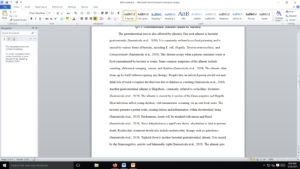Gastrointestinal diseases
Module 06 Homework Assignment
Use the information presented in the module folder along with your readings from the textbook to answer the following questions.
1. Differentiate between bacterial infection and bacterial intoxication.
2. Discuss the importance of E. coli as part of our intestinal flora.
3. Describe three (3) different types of gastrointestinal diseases caused by bacteria. Be sure to give the name of the specific organism that causes each, describe some common signs and symptoms and discuss treatment for each disease:
4. Define meningitis. Compare and contrast between bacterial and viral meningitis including treatment for each
5. What is a prion? Describe the impact prions have on the human brain and discuss two prion-associated diseases in humans: 6. What is a vector-borne (vector transmitted) disease? Give an example of a vector borne disease and the vector responsible for causing it:
apa format and referencing is highly recommended
Requirements: 3 pages
Answer preview
Meningitis is the swelling of the protective membranes that cover the spinal cord and brain. This inflammation is caused by viral or bacterial infection of the fluid surrounding the spinal cord and the brain (Oordt-Speets et al., 2018). Cancer, certain medications, and injuries can also cause the ailment. Viral meningitis is the most common form of the ailment. It is caused by non-polio enteroviruses (Kohil et al., 2021). For most cases, no specific treatment exists for the ailment since most of those with mild viral meningitis typically recover in seven to ten days without requiring therapy (Kohil et al., 2021). However, antiviral medications can treat viral meningitis caused by influenza and herpesvirus (Kohil et al., 2021). Meningitis can also be caused by bacteria (Oordt-Speets et al., 2018). This form of meningitis is quite severe, considering infected persons can die, with death happening within a few hours. Despite this, most infected individuals recover from the ailment but might have to deal with permanent
[1352 Words]

Gastrointestinal diseases

